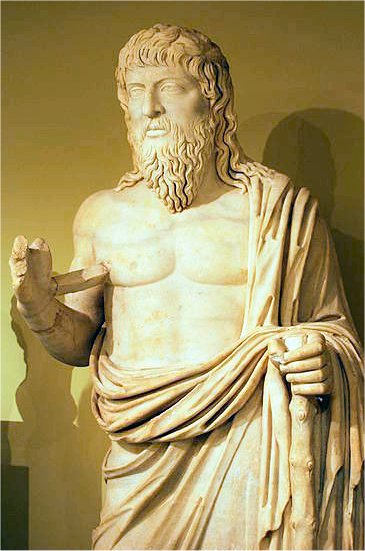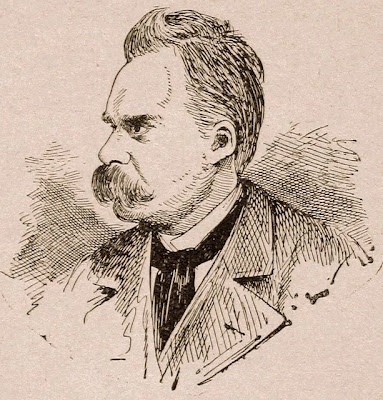From the dust jacket of Porphyry’s Against the Christians: The Literary Remains, translated by Joseph Hoffmann (Prometheus Books, 1994):
Throughout its first three centuries, the growing Christian religion was subjected not only to official persecution but to the attacks of pagan intellectuals, who looked upon the new sect as a band of fanatics bent on worldwide domination, even as they professed to despise the things of this world. Prominent among these pagan critics was Porphyry of Tyre (ca. 232–ca. 305 C.E.), scholar, philosopher, and student of religions. His book Against the Christians (Kata Christianon), condemned to be burned by the imperial Church in 448, survives only in fragments preserved by the cleric and teacher Macarius Magnes.
Of Hoffmann’s translation of Porphyry I’ll quote only a few excerpts:

Critique of the gospels
and their authors
Apocrit. II.12-II-15
The evangelists were fiction writers—not observers or eyewitnesses to the life of Jesus. Each of the four contradicts the other in writing his account of the events of his sufferings and crucifixion.
Apocrit. III.1-III.6
[John 5.46-7] “If you believed Moses, then you would believe me. For he wrote about me.” The saying is filled with stupidity! Even if Moses said it, nothing of what he wrote has been preserved; his writings are reported to have been destroyed along with the Temple. All the things attributed to Moses were really written eleven hundred years later by Ezra and his contemporaries.
Poverty saves. It seems unlikely to me that these words belong to Christ. They ring untrue to the ear. They seem to be rather the words of poor people who wish to deprive the rich of their property. Why, only yesterday Christian teachers succeeded—through quoting the words, “Sell what you have and give it to the poor and you shall have treasure in heaven”—in depriving noble women of their savings. They were persuaded to squander what they had on the beggars, giving away what was rightly theirs and making themselves beggars in return. They were turned from having to wanting, from rich to poor, from freedom to slavery and from being wealthy to being painful! In the end, these same women were reduced to going from door to door to the houses of the well-off to beg—which is the nethermost point of disgrace and humiliation. [Hoffmann’s notes that the view that women are duped by Christian “beggars” is conventional in anti-Christian polemics of the age]
[Matt. 14.25; Mark 6.48] Another section in the gospel deserves comment, for it is likewise devoid of sense and full of impossibility; I mean that absurd story about Jesus sending his apostles across the sea ahead of him after the banquet, then walking [on the water] “at the fourth watch of the night.” It is related that they had been working all night to keep the boat adrift and were frightened by the size of the storm surging against the boat.
Those who know the region will tell us that, in fact, there is no “sea” in the locality but only a tiny lake which springs from a river that flows through the hills of Galilee near Tiberias. Small boats can get across it within two hours. And the lake is too small to have whitecaps caused by storm. Mark seems to be stretching the point to its extremities when he writes that Jesus—after nine hours had passed—decided in the tenth to walk across to his disciples who had been floating about on the pond for the duration!
As if this isn’t enough, he calls it a “sea”—indeed, a stormy sea—a very angry sea which tosses them about in its waves causing them to fear for their lives. He does this, apparently, so that he can next show Christ miraculously causing the storm to cease and the sea to calm down, hence saving the disciples from the dangers of the swell.
It is from fables like this one that we judge the gospel to be a cleverly woven curtain, each thread of which requires careful scrutiny. [“each thread of which requires careful scrutiny” is nothing less that the science of New Testament analysis that, because of the fierce persecution, would not start until the publication of Reimarus’ Apologie fifteen centuries later]
The attack on Peter the apostle
Apocrit. III.19-III.22
[Acts 5.1-11] Peter is a traitor on other occasions: In the case of a man named Ananias and his wife, Sapphira, Peter put them to death for failing to surrender the profit from the sale of their land and retaining for their own use—even though they had done no other wrong. How can it been wrong for them to retain a little of what belonged to them instead of giving it all away?
The attack on Paul the apostle
Apocrit. III.30-III.36
Anyone saying both “I am a Jew” and “I am a Roman” is neither, even if he would like to be.
The man who hypocritically pretends to be what he is not makes himself a liar in everything that he does. He disguises himself in a mask. He assaults the soul’s comprehension by various tactics, and like any charlatan he wins the gullible over to his side.
[1 Corinthians 9. 20-22: “To the Jews I became like a Jew, to win the Jews. To those under the law I became like one under the law (though I myself am not under the law), so as to win those under the law. To those not having the law I became like one not having the law (though I am not free from God’s law but am under Christ’s law), so as to win those not having the law. To the weak I became weak, to win the weak. I have become all things to all people…”]
Whoever accepts such principles as a guide for living cannot but be regarded as an enemy of the worst kind—the kind who brings others to submission by lying to them, who reaches out to make captives of everyone within earshot with his deceitful ways. And if, therefore, this Paul is a Jew one minute and the next a Roman, or a student of the Jewish law now, but an another time an enemy of the law—if in short, Paul can be an enemy to each whenever he likes by burglarizing each, then clearly he nullifies the usefulness of each tradition.
We may conclude that Paul is a liar. He is the adopted brother of everything false, so that it is useless for him to declaim, “I speak the truth of Christ, I do not lie” [Rom. 9.1]; for a man who one day uses the law as his rule and the next day uses the gospel is either a knave or a fool in what he does in the sight of others and even when hidden away by himself.
I am astonished at this man’s pious regard for the law, since it is occasioned by his need to get donations from those who listen to his words.
The same man who writes, “The law is spiritual” to the Romans, and “The law is holy and the commandment holy and just” now puts a curse upon those who obey what is holy! Then, as of to confuse the point further, he turns everything around and throws up a fog so dense that anyone trying to follow him inevitably gets lost, bumping up against the gospel on the one side, against the law on the other, stumbling over the law and tripping over the gospel—all because the guide who leads them by the hand has no idea where he is headed.
